Zonisamide
Generic name: zonisamide
Brand name: Zonegran
Dosage form: oral capsule (100 mg; 25 mg; 50 mg)
Drug class: Carbonic anhydrase inhibitor anticonvulsants
Medically reviewed by A Ras MD.
What is zonisamide used for?
Zonisamide is a prescription medicine that is used to treat seizures. Zonisamide may be given to you for other reasons.
Description
Zonisamide capsules, USP is an antiseizure drug chemically classified as a sulfonamide and unrelated to other antiseizure agents. The active ingredient is zonisamide USP, 1,2-benzisoxazole-3-methanesulfonamide. The molecular formula is C8H8N2O3S with a molecular weight of 212.23. Zonisamide is a white to off-white powder, pKa = 10.2, and is moderately soluble in water (0.8 mg/mL) and 0.1 N HCl (0.5 mg/mL).
The chemical structure is:

Zonisamide capsules, USP are supplied for oral administration as capsules containing 25 mg, 50 mg or 100 mg zonisamide USP.
Each 25 mg, 50 mg and 100 mg capsule contains the labeled amount of zonisamide USP plus the following inactive ingredients: hydrogenated vegetable oil and microcrystalline cellulose. The capsule shell contains gelatin and titanium dioxide. Imprinting ink contains black iron oxide E172, butyl alcohol, dehydrated alcohol, isopropyl alcohol, potassium hydroxide, propylene glycol, purified water, shellac and strong ammonia solution. In addition 100 mg zonisamide capsule shell contains black iron oxide E172 and red iron oxide E172.
Before taking zonisamide, tell your doctor:
- If you are allergic to zonisamide; any part of this medicine; or any other drugs, foods, or substances. Tell your doctor about the allergy and what signs you had.
- If you have a sulfa allergy.
- If you have kidney disease.
- If you are breast-feeding or plan to breast-feed.
This is not a list of all drugs or health problems that interact with zonisamide.
Tell your doctor and pharmacist about all of your drugs (prescription or OTC, natural products, vitamins) and health problems. You must check to make sure that it is safe for you to take zonisamide with all of your drugs and health problems. Do not start, stop, or change the dose of any drug without checking with your doctor.
What are some things I need to know or do while I take zonisamide?
- Tell all of your health care providers that you take zonisamide. This includes your doctors, nurses, pharmacists, and dentists.
- If you are allergic to tartrazine, talk with your doctor. Some products have tartrazine.
- Avoid driving and doing other tasks or actions that call for you to be alert until you see how zonisamide affects you.
- Have blood work checked as you have been told by the doctor. Talk with the doctor.
- Sweating less has happened with zonisamide mainly in children. Sometimes, this has led to heat stroke and hospital stays. Talk with the doctor.
- Be careful in hot weather or while being active. Drink lots of fluids to stop fluid loss.
- This medicine may cause an acid blood problem (metabolic acidosis). The chance may be higher in children and in people with kidney problems, breathing problems, or diarrhea. The chance may also be higher if you take certain other drugs, if you have surgery, or if you are on a ketogenic diet. Over time, metabolic acidosis can cause kidney stones, bone problems, or growth problems in children.
- Rarely, very bad effects have happened with sulfa drugs. Sometimes, these have been deadly. These effects have included liver problems, blood problems, and very bad skin reactions (Stevens-Johnson syndrome/toxic epidermal necrolysis). Call your doctor right away if you have a rash; red, swollen, blistered, or peeling skin; red or irritated eyes; sores in your mouth, throat, nose, or eyes; fever, chills, or sore throat; cough that is new or worse; feeling very tired or weak; any bruising or bleeding; or signs of liver problems like dark urine, feeling tired, not hungry, upset stomach or stomach pain, light-colored stools, throwing up, or yellow skin or eyes.
- Talk with your doctor before you drink alcohol or use other drugs and natural products that slow your actions.
- This medicine may affect growth in children and teens in some cases. They may need regular growth checks. Talk with the doctor.
- This medicine is not approved for use in children younger than 16 years of age. Talk with the doctor.
- This medicine may cause harm to an unborn baby. Women must use birth control while taking zonisamide. If you get pregnant, call your doctor right away.
- If you used zonisamide when you were pregnant, tell your baby’s doctor.
How is zonisamide best taken?
Use zonisamide as ordered by your doctor. Read all information given to you. Follow all instructions closely.
- Take with or without food.
- Swallow whole. Do not chew, open, or crush.
- Drink lots of noncaffeine liquids unless told to drink less liquid by your doctor.
- Do not stop taking zonisamide all of a sudden without calling your doctor. You may have a greater risk of seizures. If you need to stop zonisamide, you will want to slowly stop it as ordered by your doctor.
- Keep taking zonisamide as you have been told by your doctor or other health care provider, even if you feel well.
What do I do if I miss a dose?
- Take a missed dose as soon as you think about it.
- If it is close to the time for your next dose, skip the missed dose and go back to your normal time.
- Do not take 2 doses at the same time or extra doses.
What are the side effects of zonisamide that I need to call my doctor about immediately?
WARNING/CAUTION: Even though it may be rare, some people may have very bad and sometimes deadly side effects when taking a drug. Tell your doctor or get medical help right away if you have any of the following signs or symptoms that may be related to a very bad side effect:
- Signs of an allergic reaction, like rash; hives; itching; red, swollen, blistered, or peeling skin with or without fever; wheezing; tightness in the chest or throat; trouble breathing, swallowing, or talking; unusual hoarseness; or swelling of the mouth, face, lips, tongue, or throat.
- Signs of too much acid in the blood (acidosis) like confusion; fast breathing; fast heartbeat; a heartbeat that does not feel normal; very bad stomach pain, upset stomach, or throwing up; feeling very sleepy; shortness of breath; or feeling very tired or weak.
- Change in balance.
- Not sweating during activities or in warm temperatures.
- High fever, fever that goes away and comes back, or long-lasting fever.
- Back pain, belly pain, or blood in the urine. May be signs of a kidney stone.
- If seizures are worse or not the same after starting zonisamide.
- Not able to focus.
- Trouble speaking.
- Change in eyesight.
- Memory problems or loss.
- Hallucinations (seeing or hearing things that are not there).
- Bone pain.
- Very bad muscle pain or weakness.
- A very bad and sometimes deadly effect has happened in people taking drugs for seizures like zonisamide. Call your doctor right away if you have swollen glands; fever; rash; chest pain; unable to pass urine or change in the amount of urine passed; or signs of liver problems like dark urine, feeling tired, not hungry, upset stomach or stomach pain, light-colored stools, throwing up, or yellow skin or eyes.
- Patients who take zonisamide may be at a greater risk of having thoughts or actions of suicide. The risk may be greater in people who have had these thoughts or actions in the past. Call the doctor right away if signs like low mood (depression), nervousness, restlessness, grouchiness, panic attacks, or changes in mood or actions are new or worse. Call the doctor right away if any thoughts or actions of suicide occur.
What are some other side effects of zonisamide?
All drugs may cause side effects. However, many people have no side effects or only have minor side effects. Call your doctor or get medical help if any of these side effects or any other side effects bother you or do not go away:
- Feeling dizzy, sleepy, tired, or weak.
- Headache.
- Upset stomach.
- Not hungry.
- Stomach pain or diarrhea.
- Trouble sleeping.
These are not all of the side effects that may occur. If you have questions about side effects, call your doctor. Call your doctor for medical advice about side effects.
You may report side effects to the FDA at 1-800-332-1088. You may also report side effects at https://www.fda.gov/medwatch.
If overdose is suspected:
If you think there has been an overdose, call your poison control center or get medical care right away. Be ready to tell or show what was taken, how much, and when it happened.
How do I store and/or throw out zonisamide?
- Store at room temperature.
- Protect from light.
- Store in a dry place. Do not store in a bathroom.
- Keep all drugs in a safe place. Keep all drugs out of the reach of children and pets.
- Throw away unused or expired drugs. Do not flush down a toilet or pour down a drain unless you are told to do so. Check with your pharmacist if you have questions about the best way to throw out drugs. There may be drug take-back programs in your area.
Label
PACKAGE LABEL PRINCIPAL DISPLAY PANEL – 25 MG (30 CAPSULES BOTTLE)
- NDC 59651-378-03
Rx only
Zonisamide Capsules, USP
25 mg
PHARMACIST: DISPENSE THE MEDICATION GUIDE
PROVIDED SEPARATELY TO EACH PATIENT
AUROBINDO 30 Capsules
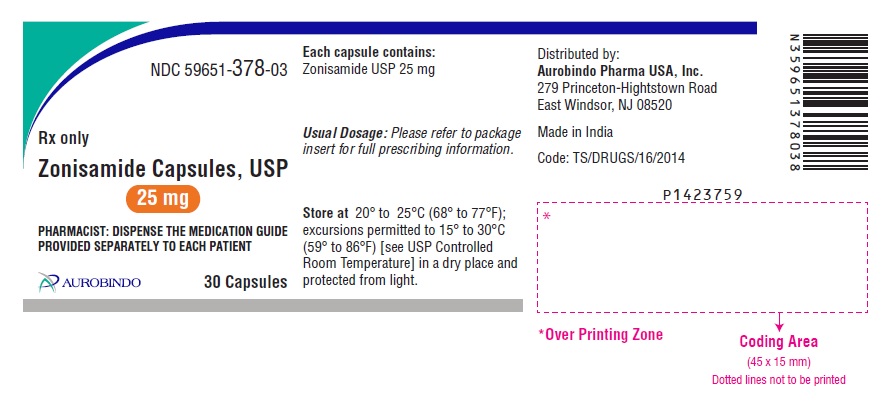
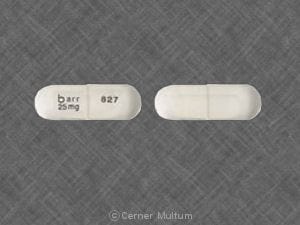
PACKAGE LABEL PRINCIPAL DISPLAY PANEL – 50 MG (30 CAPSULES BOTTLE)
- NDC 59651-379-03
Rx only - Zonisamide Capsules, USP
50 mg - PHARMACIST: DISPENSE THE MEDICATION GUIDE
PROVIDED SEPARATELY TO EACH PATIENT
AUROBINDO 30 Capsules
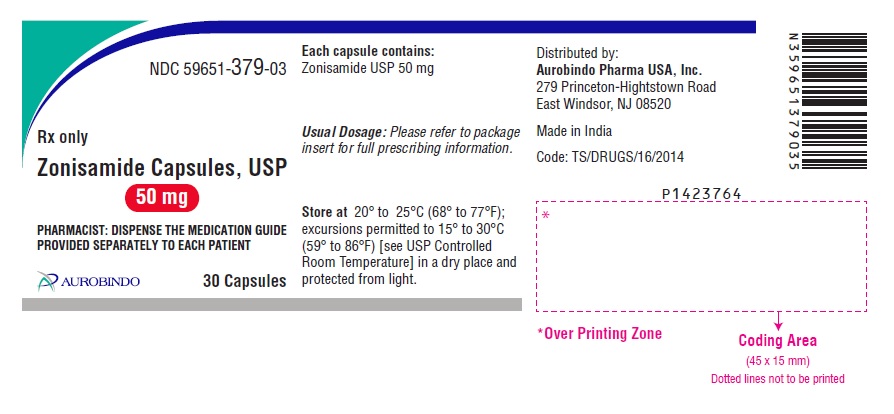
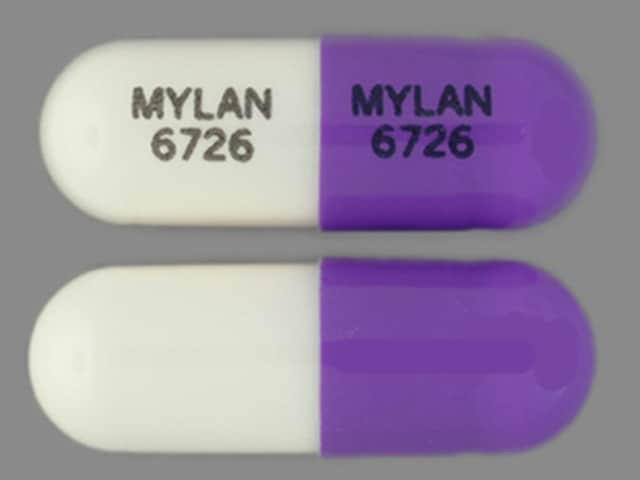
PACKAGE LABEL PRINCIPAL DISPLAY PANEL – 100 MG (30 CAPSULES BOTTLE)
- NDC 59651-380-03
Rx only
Zonisamide Capsules, USP
100 mg
PHARMACIST: DISPENSE THE MEDICATION GUIDE
PROVIDED SEPARATELY TO EACH PATIENT
- AUROBINDO 30 Capsules
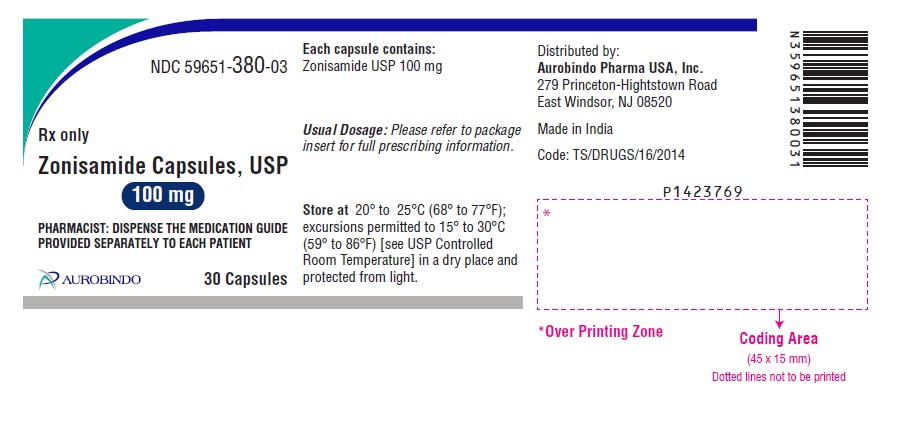

SRC: NLM .
